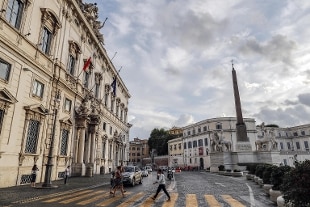Share
02 September 2020The II civil section of the Court of Rome referred to the Constitutional Court the entire matter of collecting signatures for the presentation of the lists in the elections, contained in the current electoral law, namely the Rosatellum bis, approved in 2017. The provision was issued by accepting the appeal proposed by Riccardo Magi and + Europa, assisted by prof.
Caravita and Andrea Mazziotti, former president of the constitutional affairs commission, at the time in + Europe and subsequently passed on to the action of carlo Calenda.
Mazziotti himself reports it to Ansa and hopes that the consultation will reject the current "archaic and illiberal" rule.
The court of Rome raises the question of legitimacy, for violation of the Constitution and the European Convention on Human Rights, of the article of the Rosatellum bis in the part in which it requires the collection of 1,500 signatures for candidates in multi-member colleges, or half in the case of early elections, and limits the exemption from the burden of collecting subscriptions to parties constituted as a parliamentary group in both chambers from the beginning of the legislature.
In the ordinance - which compares the Italian system to those of various foreign countries such as France, where no signatures are required, or Germany, where the number is much lower - it is stated that, although the requirement to collect signatures is legitimate in itself, "the concrete methods of relative fulfillment, the times and uncertainties generated by a more than ten-year completely impromptu derogation practice, on the whole, provoke a surreptitious elision of the exercise of the right to passive electorate rather than ensuring its reasonably coherent discipline ".
The judge justifies the remission by arguing that the long practice of exceptions to the requirements relating to signatures, also applied in 2017 with a reduction of total signatures to 1/4 of what is currently expected, demonstrates that the awareness of the vexatious and concrete impracticability for a wide audience of political formations "of the discipline of access to candidacies.
"It is a great success, a turning point that will bring Italy back to legal civilization, bringing it closer to other Western countries, where the rules on participation in elections are much less restrictive", commented Andrea Mazziotti, commenting on the decision.
"Now we are confident - he adds - that the consultation will put an end to an archaic, illiberal, Byzantine and self-referential system, which the parties have cooked together from legislature to legislature with the aim of reducing participation in elections as much as possible".

